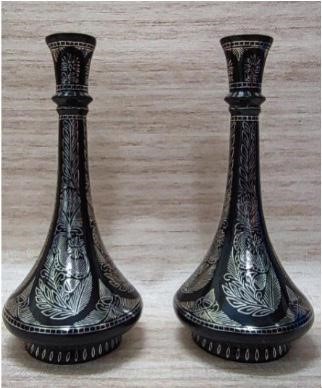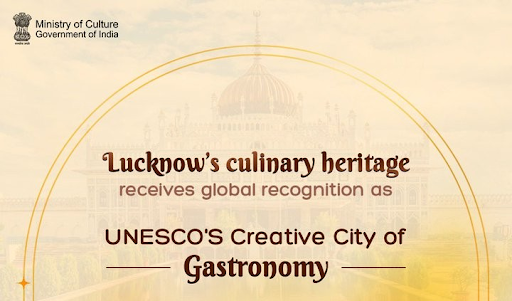Description

Disclaimer: Copyright infringement not intended.
Context
- PM Modi Gifts Bidri Work Pair Of 'Surahi' To South African President during 15th BRICS Summit
Details
- Prime Minister Narendra Modi's gesture of presenting a Bidri work pair of 'Surahi' to South African President Cyril Ramaphosa serves as a testament to India's rich artistic heritage and diplomatic finesse.
- The intricate Bidri craft, originating from Bidar in Karnataka, holds profound cultural significance and reflects the synthesis of diverse artistic traditions.
Cultural Diplomacy and Significance
- Symbol of Heritage: The presentation of Bidri craft signifies India's deep-rooted artistic heritage, showcasing the country's creative prowess and cultural diversity.
- Bridging Cultures: Gifting Bidriware fosters cultural exchange by sharing India's craftsmanship with the world, thus strengthening diplomatic ties and fostering mutual understanding.
- Preservation and Promotion: International recognition garnered through such exchanges contributes to the preservation of traditional crafts by creating demand and appreciation on a global stage.

Dimensions of Bidri Craft's Promotion
- Empowering Artisans: Initiatives supporting Bidri artisans ensure the continuity of this heritage craft, providing livelihood opportunities and safeguarding traditional skills.
- Global Exposure: Such diplomatic gestures amplify the reach of Bidriware, making it known to a broader international audience and garnering appreciation for its intricate artistry.
- Cultural Identity: Bidri craft encapsulates India's historical narratives and artistic genius, acting as a cultural ambassador that transcends borders.
Origins and Techniques
- Bidri craft originated around the 14th century during the Bahmani Sultanate's reign in Bidar.
- It is the result of the fusion of Persian and local Indian artistic traditions.
- The distinctive dark hue of Bidriware comes from a special alloy of zinc, copper, and traces of other metals.
- The intricate patterns are etched onto the metal surface using chisels and then inlaid with pure silver or gold wires.
- The alloy is then oxidized to achieve the characteristic black color, creating a striking contrast with the silver or gold designs.
Crafting Process
- Design: Master artisans sketch intricate designs that blend traditional motifs, geometric patterns, and intricate calligraphy.
- Molding: The design is carefully traced or embossed onto the alloy surface.
- Engraving: Expert craftsmen use chisels and hammers to engrave the intricate patterns.
- Inlay: Thin silver or gold wires are meticulously hammered into the engraved lines, creating a seamless fusion of metal and design.
- Oxidization: The object is buried in a mixture of soil and ammonium chloride, resulting in the blackened background and highlighting the inlaid designs.
- Buffing and Polishing: The excess oxide is rubbed off, revealing the silver or gold inlays in stark contrast.
- Final Touches: The object is polished to a smooth finish, enhancing its visual appeal and tactile experience.

Conclusion
Prime Minister Modi's choice of gifting Bidri craft exemplifies the power of cultural diplomacy. Beyond being an ornate object, the Bidri 'Surahi' represents India's history, craftsmanship, and commitment to sustaining its cultural legacy. This exchange showcases the ability of art to transcend geographical boundaries and serve as a bridge of understanding between nations, thus fostering global unity through cultural appreciation.
|
PRACTICE QUESTION
Q. How does the gift of Bidri craft by Prime Minister Modi to South African President Ramaphosa exemplify the fusion of artistic heritage and diplomatic relations, and what broader significance does such cultural exchange hold? (150 Words)
|
https://www.ndtv.com/india-news/pm-modi-gifts-bidri-work-pair-of-surahi-to-south-african-president-cyril-ramaphosa-4327477















